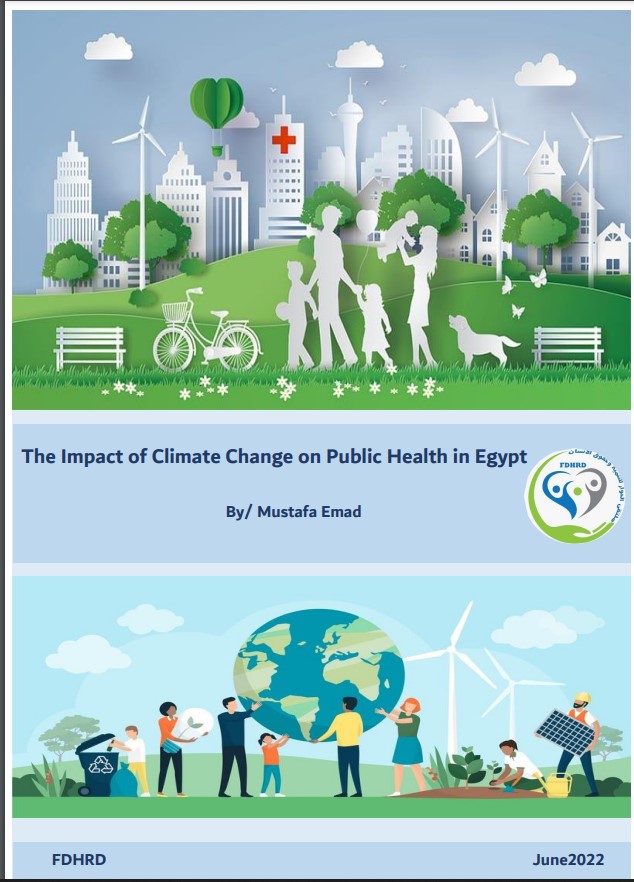Press Release
…………………………………………………
Today, Monday, June 6, 2022, the Unit of Research and Studies at the Forum for Development and Human Rights Dialogue (FDHRD) issued a report entitled: (The Impact of Climate Change on Public Health in Egypt).
The report stressed that climatic factors attack public health and the right to health, resulting in an increase in the incidence of diseases and deaths caused by heat waves, hurricanes and droughts, and the spread of diseases transmitted by insects and water. It leads in addition to an increase in the severity of chronic diseases resulting from environmental pollution that predispose to lung diseases.
The report touched on the right to health in international agreements and the Egyptian constitution in 2014. As well as mentioning international agreements to combat climate change (the 1987 Montreal Protocol, the 1992 United Nations Framework Convention on Climate Change, the 2005 Kyoto Protocol, and the 2015 Paris Agreement).
The report also dealt with the objectives of the National Human Rights Strategy and the National Strategy for Climate Change in Egypt 2050, which are concerned with public health from the repercussions of climate change.
The report dealt with the impact of climate change on the right to health and public health in Egypt, and stated:
Air pollution, resulting primarily from burning fossil fuels, causes 13 deaths per minute worldwide, and reducing air pollution would reduce the total number of global deaths from air pollution by 80% and reduce greenhouse gas emissions.
Climate change affects health in many ways, including directly through extreme weather or changes in temperature; and indirectly through changes in natural systems that lead to crop failure, expansion of disease vectors, and displacement of people. These repercussions contribute to human exposure to diseases and injuries.
Climate change has a significant impact on health, as it causes the death of 250 thousand people annually, and other diseases related to climate change, including diarrhea and nutrition. Egypt recorded 100 deaths in 2015 as a result of high temperature and 15 people died as a result of the severe drop in temperature.
The report presented the resulting climate repercussions on health, as follows:
1- Chronic Diseases
The field of ‘Environmental Medicine’, one of the branches of medical science, focuses on the quality of environmental factors that lead to diseases. Specialists assert that climate change contributes to increasing hunger and affecting healthy aging, and the spread and endemicity of some non-communicable diseases, such as “chronic diseases”. These deases such as heart disease, stroke, high blood pressure, diabetes, cancer, and chronic respiratory diseases. Climate changes also affect the extent to which individuals respond to these diseases and weaken their ability to recover. The report mentioned the incidence of these diseases in Egypt.
2- Infectious Diseases
The report highlighted some of the infectious diseases associated with climate change, including those that increase mortality rates. Nearly two-thirds of human and animal pathogens are sensitive to climate. Vector-borne diseases (VBDs) are mainly transmitted by arthropod vectors such as the Culex Pipiens, which is common in Egypt and causes West Nile fever.
3- Suicide and Mental Illness
There is a relationship between rising temperatures and an increase in suicide rates. The climate crisis is causing widespread psychological stress of severe anxiety among individuals aged 16-25, and affecting daily work performance.
4- Rights of Persons with Disabilities
Climate change directly and disproportionately threatens the right of persons with disabilities to health due to rising ambient temperatures, rising air pollutants and increased exposure to extreme weather events including heat waves, fires and floods.
5- Food Security
Climate changes lead to disruption in the food security equation through reduced crop and livestock production. This leads to higher food prices resulting from increased production costs. Food security in Egypt was affected faster than global expectations, as it came ten years early, which reflected on the productivity of agricultural lands. For example, climate change threatens the flooding of the Nile Delta in Egypt due to sea level rise, 6 million feddans of agricultural land in Lower Egypt.
The report concluded that states have obligations to respect, protect and fulfill human rights, and this includes obligations to mitigate domestic gas emissions, and to protect citizens from the harmful effects of climate change. Egypt’s hosting of the Climate Summit (COP27) in Sharm El-Sheikh next November is an opportunity to address the implications of climate change on public health in southern countries that lack the infrastructure for health sectors that support them in adapting to climate changes.








